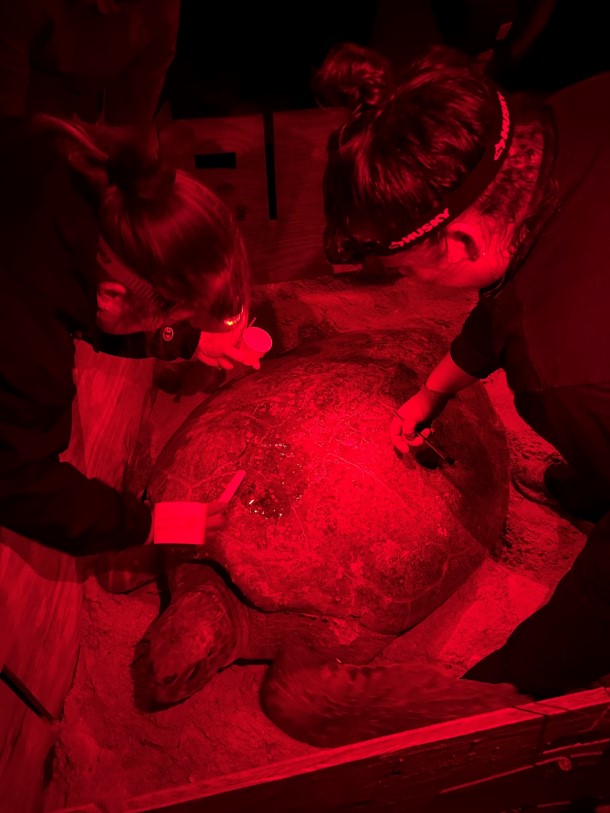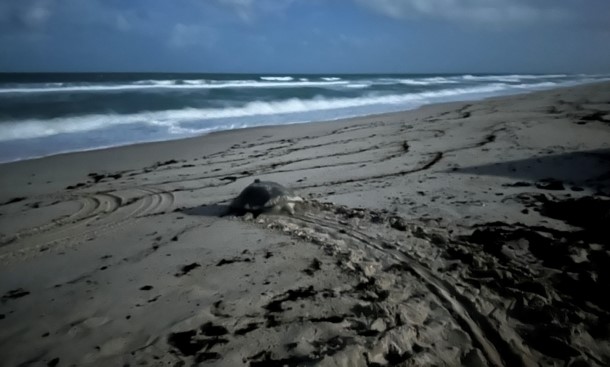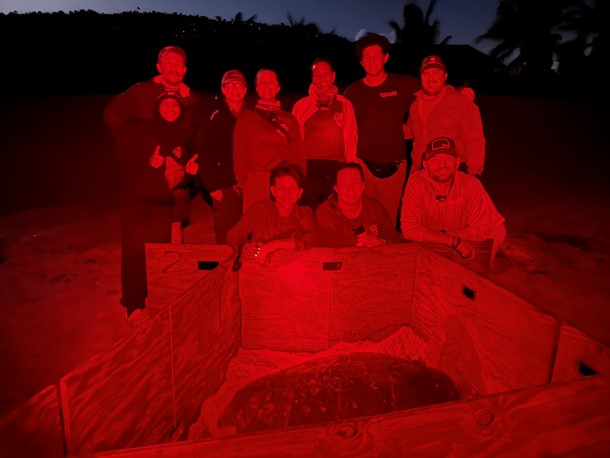Back in the turtle tagging business
Posted on June 28, 2024
It's been over five years since we've done any sea turtle tagging in the Atlantic but the Navy has some new recruits! The first satellite telemetry tags have recently been deployed for a new project seeking to explore how Kemp’s ridley and green sea turtles utilize the water column in habitats along the east coast of the United States. The diving ecology of these species is under-studied in the region and this project seeks to fill that critical data gap. The goal of this project will be to deploy 75 tags per species over the next three years on turtles >30 centimeters in shell length, including juvenile and adult turtles.
Researchers at the University of Central Florida (UCF), led by Dr. Kate Mansfield, supported by the UCF Marine Turtle Research Group, and Andrew DiMatteo of CheloniData LLC, deployed five satellite-linked data loggers on adult nesting green turtles at the Archie Carr National Wildlife Refuge in Florida during the week of June 17th. These tags will collect dive depth and temperature records, as well as dive behavior data, allowing researchers to explore the diving ecology of these animals. These data can be used to account for animals unseen by aerial observers in broad scale surveys (i.e. availability bias), allowing for better estimation of at-sea animal populations, in addition to a wealth of other ecological and conservation applications.
The satellite tagged adult nesting green turtles will sample inter-nesting habitats off the coast of Florida. The turtles will lay several clutches of eggs on the beach separated by a week or two of residency in nearshore waters. By the end of the summer these nesting females will travel to foraging habitats in the Florida Keys, wider Caribbean, or further north along the east coast of the US. Later season tag deployments on nesting females are planned as well in order to sample animals traveling directly to their post-nesting habitats. Tagged turtles also had skin, blood, and egg samples taken to assess the animals’ foraging ecology by examining stable isotope signatures in the samples to determine where the turtles were foraging leading up to their reproductive migrations to the Archie Carr National Wildlife Refuge. This is part of an ongoing project in collaboration with Dr. Simona Ceriani of Florida Fish and Wildlife Conservation Commission. These samples will also contribute to UCF’s on-going monitoring and research projects including reproductive output, health assessments, and studies related to disease ecology, and behavior.
 Dr. Kate Mansfield and PhD candidate Tiffany Dawson prepare to epoxy a satellite telemetry tag to the carapace of a nesting green sea turtle.
Dr. Kate Mansfield and PhD candidate Tiffany Dawson prepare to epoxy a satellite telemetry tag to the carapace of a nesting green sea turtle.
In addition to the ecological and scientific questions being asked as a part of this project, partnering with the UCF Marine Turtle Research Group supports early career professional and student development. Graduate student-led field teams supported by undergraduate interns gained invaluable hands-on experience with tagging sea turtles in the wild last week, under the instruction of Dr. Kate Mansfield, who is an expert in tagging turtles. This work and the UCF program also supports student-driven research at the graduate and undergraduate level.
UCF Marine Turtle Research crew of graduate students, staff, and undergraduate interns, as well as Andrew DiMatteo (CheloniData LLC), with a nesting green sea turtle.
“Gaining hands-on research experience at such a high level as an undergraduate student has been an amazing way to further solidify my passion for conservation. Having the opportunity to spend time physically attaching satellite tags, as well as working on data analysis using ArcGis and R has been a great way to see myself truly working as a biologist.” ~ Whitney Maxfield (Research Experience for Undergraduates National Science Foundation Intern)
“I enjoyed being hands-on for the transmitter attachment process and seeing how each step helps to extend the attachment time. Since we generally see the turtles on the nesting beach, I’m excited to see what we learn about their in-water movements.” ~ Tiffany Dawson (University of Central Florida PhD Candidate)
Stay tuned for news of future deployments both in Florida and along the east coast.
 Green sea turtle makes her way back to the ocean after laying a nest of eggs and having a satellite telemetry tag attached to her carapace.
Green sea turtle makes her way back to the ocean after laying a nest of eggs and having a satellite telemetry tag attached to her carapace.
Animals tagged and sampled under UCF Marine Turtle Research Group’s protected species permits including Florida permit number MTP-24-171A
Follow this project and the UCF Marine Turtle Research Group on social media:
X/Instagram/Threads: @UCFTurtleLab
Facebook: www.facebook.com/ucfmtrg
Website: www.sciences.ucf.edu/biology/marineturtleresearchgroup


